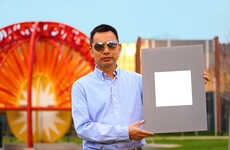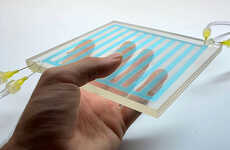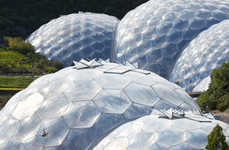
MIT and the University of Hong Kong Aim to Combat Climate Change
Justin Lam — November 15, 2018 — Eco
References: news.mit.edu & engadget
Scientists at MIT and the University of Hong Kong have recently collaborated to develop new heat-rejecting window coatings that could help reduce air conditioning costs. To accomplish this feat, the heat-rejecting window coatings turn slightly opaque when exposed to temperatures above 32 degrees Celsius. By turning opaque, the coating reflects 70 percent of the sun's heat and in-turn reduces interior temperatures and reduces the load on an air conditioner.
The heat-blocking technology of the window coating comes from its construction of tiny water-filled spheres made into a standard poly material. While this technology has been explored before, researchers at MIT and University of Hong Kong realized that the spheres would also need to match the wavelength of infrared light responsible to most solar heating. The heat-rejecting window coatings have the same feel as plastic wrap and could easily be put on any existing windows.
The heat-blocking technology of the window coating comes from its construction of tiny water-filled spheres made into a standard poly material. While this technology has been explored before, researchers at MIT and University of Hong Kong realized that the spheres would also need to match the wavelength of infrared light responsible to most solar heating. The heat-rejecting window coatings have the same feel as plastic wrap and could easily be put on any existing windows.
Trend Themes
1. Heat-rejecting Window Coatings - New window coatings that turn opaque when exposed to heat, reducing interior temperatures and air conditioning costs.
2. Infrared-matching Water-filled Spheres - Research focused on matching the wavelength of infrared light responsible for solar heating to tiny water-filled spheres in window coatings.
3. Affordable Energy-saving Solutions - Development of cost-effective window coatings that reduce the need for air conditioning and contribute to combating climate change.
Industry Implications
1. Construction - Innovative window coatings that can reduce energy consumption and contribute to sustainable building practices.
2. Architectural Design - Window coatings that offer both aesthetic appeal and energy efficiency, providing architects with new design possibilities.
3. Climate Control - Advancements in heat-rejecting window coatings that can contribute to more energy-efficient and eco-friendly climate control solutions.
3.5
Score
Popularity
Activity
Freshness























